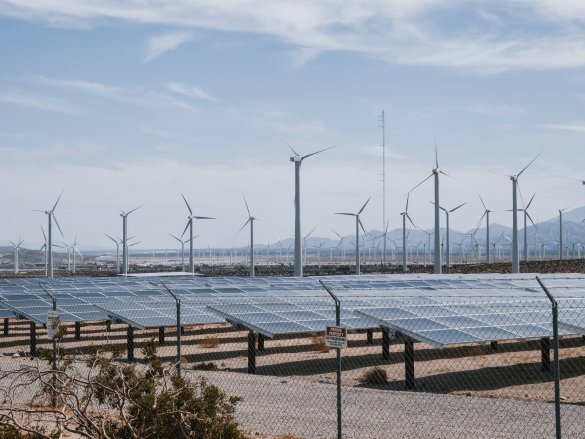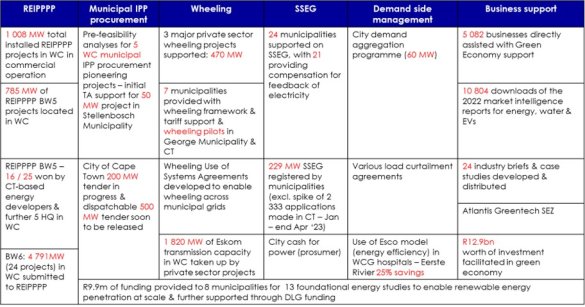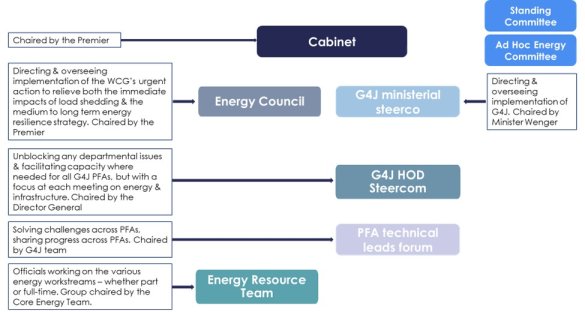Western Cape Energy Resilience Programme

South Africa is facing an ongoing and worsening energy crisis, with load shedding increasing year on year: load shedding was experienced on 43% of the days of 2022, with more than double the load shedding of 2021. By the end of May 2023, there had been only 1 day in 2023 with no load shedding, with predictions showing an average of stage 4 for most of 2023. The crisis is caused by energy supply shortages (6 GW shortfall as of September 2022), which are in turn caused by a myriad of factors such as over-sweated power plants leading to poor performance, a lack of good quality coal, labour challenges, and infrastructure failures, amongst others.
The current South African energy crisis places severe strain on the economy and future economic growth as well as on business profitability and confidence. The Western Cape is estimated to have lost between R48.6 billion and R61.2 billion in real Gross Domestic Product (GDP) since load shedding commenced in late 2007. In 2022, the real GDP lost to the Western Cape was estimated at R8.2 billion. The estimated cost of load shedding on the Western Cape’s economy, in stage 4, amounts to R43 million / day, as some companies’ outputs drop to zero. These figures are expected to grow significantly if the country is subjected to record high levels of load shedding in 2023, which at this stage appears likely. Further economic impacts include: supply chain and reputational impacts on exports and production; impacts on the tourism industry, a lifeblood of the province; destruction of agricultural production capacity that will lead to food shortages, with knock-on higher prices, household food insecurity and social unrest. All of this together would exacerbate the severity of an economic recession, severe job losses in the Western Cape, and business and investor confidence.
With electricity customers moving to installing their own energy generation systems, municipal financial sustainability is increasingly at risk - which in turn affects the ability of municipalities to cross subsidise indigent households and other services - unless municipalities become part of new system. There continue to be high and growing financial costs to address the immediate electricity constraints (e.g. sunk costs and diesel). The impact on consumers related to the affordability of rising electricity costs is significant, with the latest 18.65% Eskom increase being a case in point.
Additional to the above, in the face of climate change, South Africa has made international commitments to reducing greenhouse gas emissions and the Western Cape Government has set itself on a path to zero carbon by 2050. Meeting these targets will help to reduce the risks posed by the carbon border adjustment mechanisms (CBAM) being developed and implemented by many of the Western Cape’s export markets.
The Western Cape Government has long been aware of both the energy security challenges facing the country and the need to focus on responding to climate change. To this end, substantial work has been undertaken to build energy resilience in the province including:

Despite the above, it has been recognised that the scale and speed of implementing energy-related work needs to be increased. The WCG has therefore undertaken a whole of government approach to developing and implementing the programme[1], together with the injection of substantial budgets over the MTEF period (2023/24 to 2025/26)[2].
The WCG has also undertaken substantial work on responding to climate change, with the first Western Cape Climate Change Strategy being developed in 2008 and updated in 2014 and 2022, and with multiple climate change mitigation and adaptation interventions towards achieving the strategy’s goals being implemented across the Province.
[1] WCG depts: Department of the Premier, Department of Local Government, Department of Infrastructure, Provincial Treasury, Department of Economic Development and Tourism, Department of Environmental Affairs and Development Planning, Department of Agriculture, Western Cape Education Department, Department of Health and Wellness; as well as the City of Cape Town & all Western Cape municipalities
[2] WCG: R1.1 billion; City of cape Town: R3.9 billion; & WC municipalities: R1.9 billion
Given the severity of the energy crisis, the strategic objectives of the Western Cape’s Energy Resilience Programme (WC ERP) are twofold:
- to reduce the impacts of load shedding on businesses and citizens in the Western Cape and
- to facilitate a lower level of reliance on Eskom in the Western Cape.
The programme serves to implement the ‘energy resilience and transition to net zero carbon’ priority focus area of the Growth for Jobs Strategy which includes taking a Whole of Government and Whole of Society approach to ensure faster delivery and delivery at a greater scale.
The targets for reduced reliance on Eskom are as follows:
- reduce off take between 500MW – 750MW by 2025 (Short Term)
- reduce off take between 750MW - 1 800MW by 2027 (Medium Term) and
- reduce off take between 1 800MW - 5 700MW by 2035 (Long Term).
In the current setting, 1 000 MW of power Nationally and 100 MW in the Western Cape equates to 1 stage of load shedding.
The WC ERP comprises interventions that are categorised into six categories:
- Disaster mitigation and management (load shedding relief programme) to minimize the impacts of load shedding
- Provincial Integrated Resource Plan to provide an evidence-based and cost-optimal plan of energy options to enable planning and investment
- Demand side management programme to enable right sizing and reduced cost of alternative energy systems and negotiations regarding load shedding buffering for the province
- New energy generation programme to enable the generation, procurement and trading of low-carbon energy
- Network development programme providing for the maintenance and expansion of the required grid infrastructure to enable the movement of energy using the grid and
- Increased investment in the energy sector - to attract financing for the implementation of the programme, to enable financing mechanisms to unlock implementation at scale and to attract local production.
To give effect to these objectives, a series of projects grouped into the above categories have been identified for implementation over the short, medium and long term. These projects include the continuation and upscaling of existing interventions as well as the conceptualisation and implementation of new initiatives. The scope, scale and number of projects are expected to change over time based on taking a data-driven and evidence-based approach that will provide insights into the extent of impact, responsiveness to need and change as well as key trends in the energy landscape.
While each project is led by a particular WCG department or local government body, all energy projects are transversal by nature as they are all deeply interconnected with each other. The projects are a mixture of those with a budget, those with a budget designed to leverage further funding to enable scaled implementation, and those undertaken partially or fully by internal capacity.
Beyond the projects, there are several areas of work required to connect the whole and build the ecosystem, together with external stakeholders, including:
- Strategic planning, prioritisation and co-ordination across all WCG departments and other external players in implementing the energy resilience programme
- Data collation - on project progress, the state of the energy system, economic and other impacts, and for energy modelling
- Communication - internal and external, across all spheres of government, the private sector and civil society, to build awareness, be transparent, and to help all to take action and build resilience.
- Stakeholder management - understanding and working closely with stakeholders critical to the effective implementation of the programme, and most impacted by the state of energy and ensuring all others are consulted and informed as needed.
- Solutions funnel - building continual awareness and undertaking assessments of solution options, linking these with the relevant stakeholders, using these to inform the strategic programmatic energy resilience approach etc.
- Managing queries from businesses, industry associations, potential funders and financiers, public sector organisations and others
- Legal and policy advocacy - understanding and building the case for legal and policy changes required to enable the energy system changes
- Monitoring and evaluation of projects and the programme outputs and outcomes
- Management of provincial energy disaster management functions (incl. municipal, private sector and citizen business continuity planning) and ensuring energy supplies for critical municipal services
- Procurement / SCM unlocking barriers / simplifying processes / centralized procurement where needed etc.
- Linkages with other priority focus areas of the Province’s growth for jobs strategy, such as exports and investment.
An effective response to the energy crisis in the Western Cape requires an enabling governance arrangement and structure that will support planning and implementation at the required level of urgency, while assisting in unlocking potential opportunities and unblocking barriers and constraints. The diagram below illustrates the governance structures related to energy. It is acknowledged that these need to be further streamlined to enable maximum focus on delivery.

Western Cape Energy Council
The Western Cape Energy Council is established for the purpose of identifying and actioning solutions to the energy crisis. This includes directing and overseeing the implementation of the Western Cape Government’s urgent action to relieve both the immediate impacts of load shedding and its medium to long-term energy strategy. The focus of the Council will be to approve the energy strategy and approach, drive and support the related objectives and interventions as well as coordinate communication across the Province and with National and Local Government as well as other key stakeholders and energy experts.
The Council is authorised to make the required decisions that steer and aim to achieve the short-, medium- and long-term objectives of the Energy Resilience Programme and Strategy. The Council is chaired by the Premier of the Western Cape and the composition of the Council will include relevant ministers, municipal representation, and key members from the administration as well as external stakeholders that work in the energy space or who are deemed critical toward effective strategic planning and implementation.
G4J HOD Steering Committee
The Growth for Jobs (G4J) Strategy is the economic growth strategy for the WCG. Energy resilience and the transition to net zero is one of the seven priority focus areas within G4J. The G4J HOD Steering Committee includes all relevant WCG heads of department to enable the unblocking of any projects that are part of the G4J implementation plan.
Energy Resource Team
While each of the projects are led by a specific WCG department, the delivery thereof requires support from several other departments. Additionally, all programmes, projects and operations interlink with others. The Energy Resource Team is therefore aimed at enabling the co-ordination of and information sharing between all departments on energy-related matters and thus includes officials from all relevant WCG departments who are working on energy programmes, projects and operational matters - whether funded or not.
